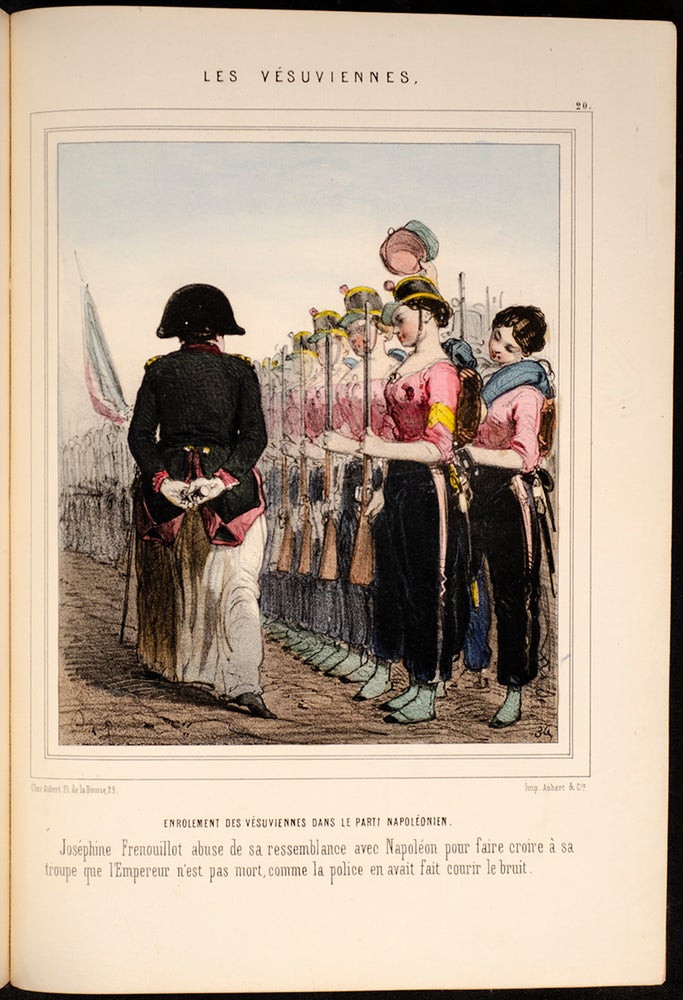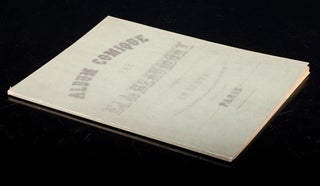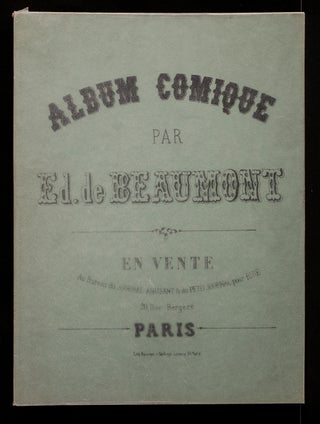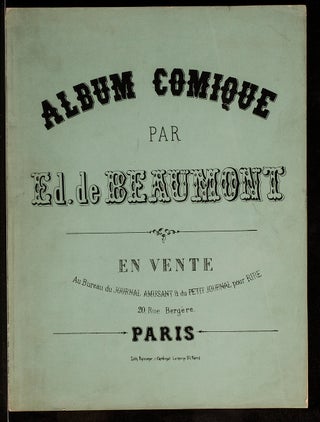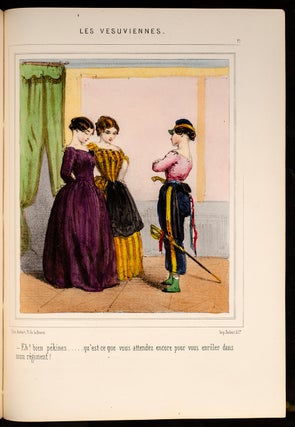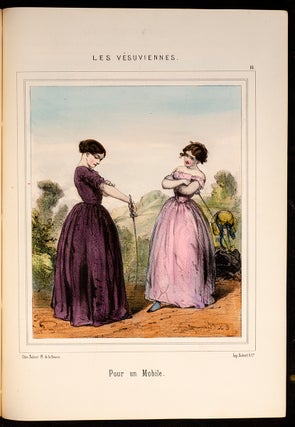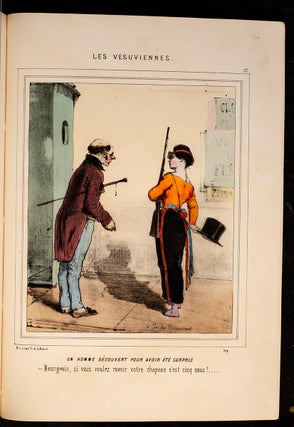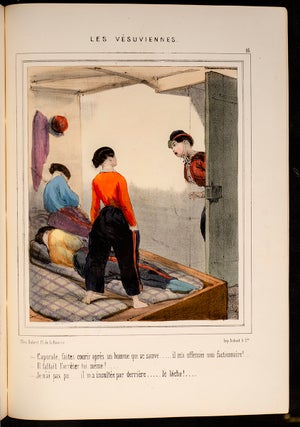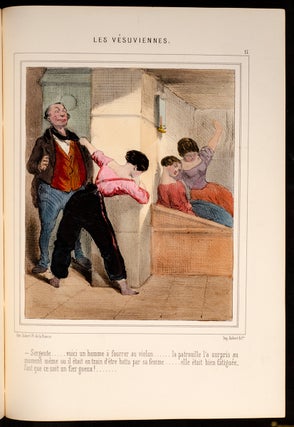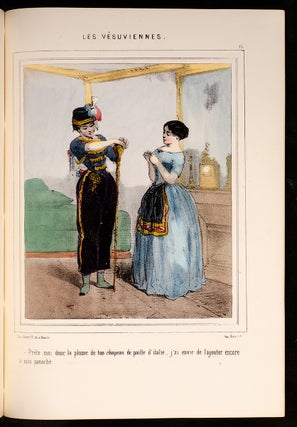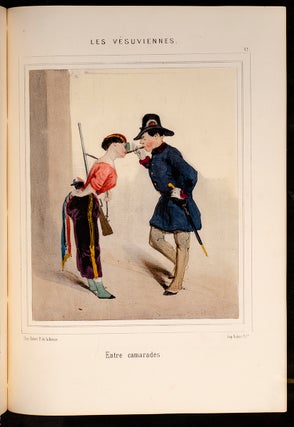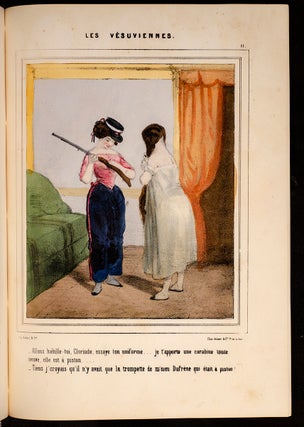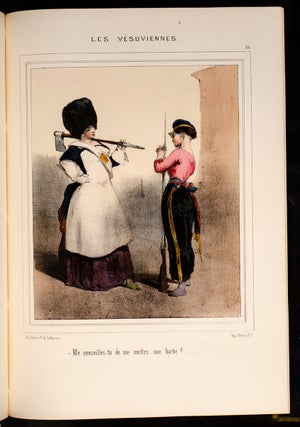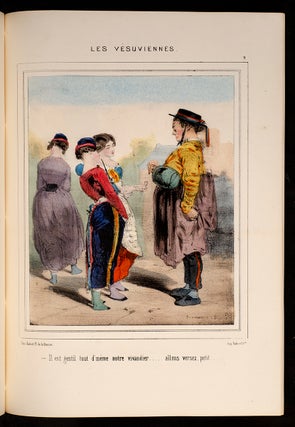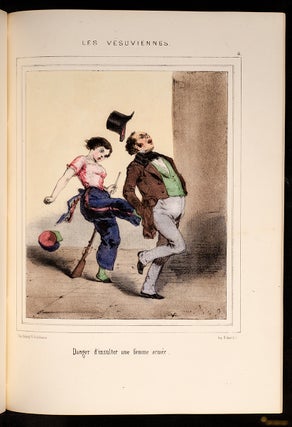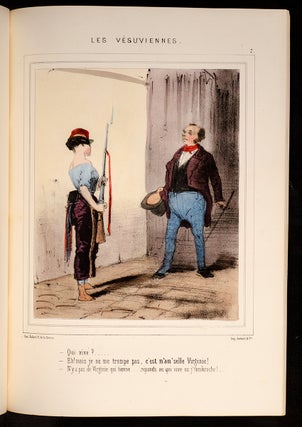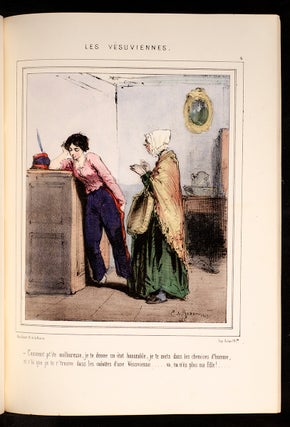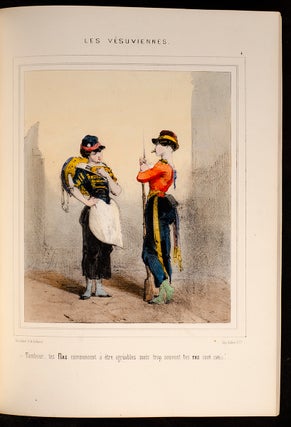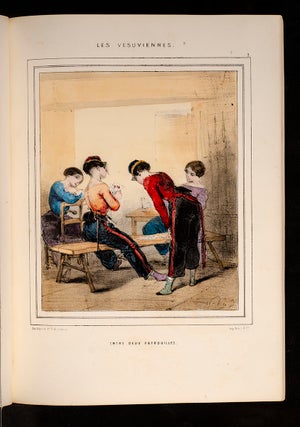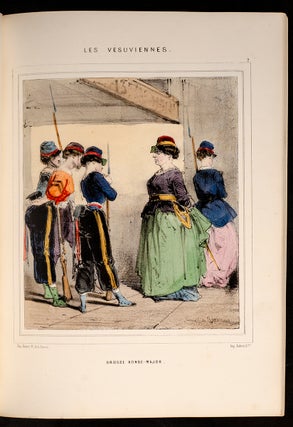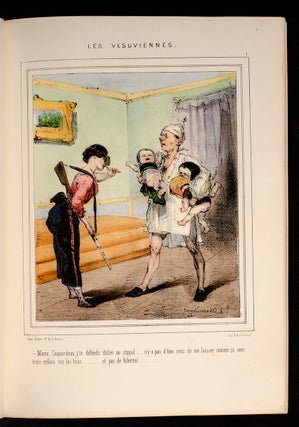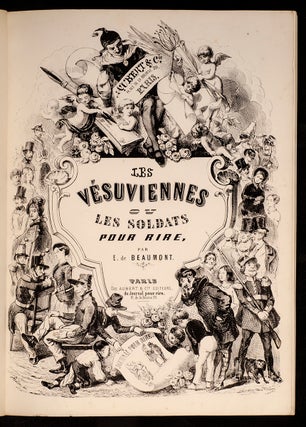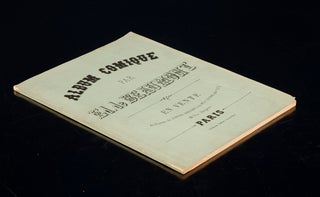Les Vésuviennes
Paris: Chez Aubert & Cie. Editeurs, 1848. Item #05256
Les Vésuviennes - The Radical feminist Group as Depicted by Charles Édouard de Beaumont
Twenty Superb Hand Colored Lithographs
BEAUMONT, [Charles-]É[douard] de. Les Vésuviennes ou les Soldats pour rire… Paris: Chez Aubert & Cie. Editeurs, [1848].
Folio (12 15/16 x 9 3/4 inches; 328 x 247 mm.). Pictorial lithograph title and twenty superb hand-colored lithograph plates, all heightened with gum arabic.
Publishers lithographed pale green wrappers, rear wrapper expertly replaced with near identical paper. Original glassine wrapper. An exceptionally fine copy. Housed in a felt-lined half black morocco over gray cloth boards clamshell case, spine with five raised bands, ruled and lettered in gilt.
The twenty superb hand colored lithographs in Les Vésuviannes depict an imagined state of society in which there is great suffering and injustice, in which women take the functions of national guards and policemen. The title is linked to the resumé of a radical feminist group that actually existed following the February revolution which militated the female military service the ability to dress like men, as well as women for the equality in housework. Historically, the first community of Vesuvius was established in Belleville. On March 26, 1848, at the foot of the Vendôme column.
A whole legion of young women from 15 to 30 years old passed behind a tricolor banner with the word 'Vésuviennes'.
At noon, they went to the city hall, to ask for the help and protection of the provisional government.
The Vésuviennes were a radical feminist group that existed in France in the middle of the 19th century. They chose their name (derived from Mount Vesuvius) because, in their words, "Like lava, so long held back, that must at last pour out around us, [our idea of feminist equality] is in no way incendiary but in all ways regenerating." With the overthrow of King Louis-Philippe of France in 1848, the newly formed Republic lifted all restrictions on the press and assembly. This encouraged a proliferation of new feminist publications, organizations, and groups. The Vésuviennes were among the latter. Considered to be the most radical of all of the feminist factions of the time, the Vésuviennes promoted female military service, the right of women to dress the same as men, and legal and domestic equality between husband and wife, even as that extended to the distribution of household chores. Most Vésuviennes were between the ages of 15 and 30, unmarried, poorly paid workers. Even some other feminists disapproved of their tactics, which included wearing culottes (not unlike the bloomers worn by radical American feminists at the time) and staging frequent street demonstrations. The image of a young woman in culottes came to represent all feminists to some, as can be seen in the caricatures of Charles-Édouard de Beaumont, one of several artists who satirized the efforts of feminists of the period in popular political papers such as Le Charivari. Until recently the existence of this feminist organization was regarded as genuine, if poorly documented. Some historians have recently argued that the organization was itself "a burlesque creation of the French police who drew up a constitution for it and provided it with prostitutes as members". (Wikipedia).
The Plates:
1. Mâme Coquardeau, j’te défends d’aller au rappel…n’y a pas d’bon sens de me laisser comme ça avec trois enfans sur les bras…et pas de biberon!...
Mâme Coquardeau, I forbid you to go to the rappel...it doesn't make sense to leave me like that with three children on my arms...and no bottle!...
2. Grosse Ronde-Major.
Big Round-Major.
3. Entre Deux Patrouilles.
Between Two Patrols.
4. Tambour, tes flas commencent à être agréables mais trop souvent tes ras sont rates!...
Drum, your flas are starting to be nice but too often your ras are misses!...
5. Tiens, Virginie c’est la première fois qu’on peut se flatter de m’avoir mise au pas!...
Hey, Virginie, it's the first time you can flatter yourself that you've brought me to heel!...
6. Comment pt’ite malhureuse, je te donne un état honorable, je te mets dans les chemises d’homme, et v’là que je te r’trouve dans les culottes d’une Vésuvienne…va, tu n’es plus ma fille!...
How unfortunate you, I give you an honorable status, I put you in men's shirts, and here I find you in the panties of a Vesuvian woman... come on, you're no longer my daughter !...
7. Qui vive?... Eh! mais je ne me trompe pas, c’est m’am’selle Virginie! N’y a pas de Virginie qui tienne…réponds au qui vive ou j’témbroche!...
Who lives?... Hey! but I'm not mistaken, it's madame Virginie! There's no Virginia that holds ... answer the question or I stumble!...
8. Danger d’insulter une femme armée.
Danger of insulting an armed woman.
9. Il est gentil tout d’même notre vivandier…allons versez, petit…
He is nice all the same, our vivandier… let’s pour, little one…
10. Me conseilles-tu de me mettre une barbe?...
Do you advise me to put on a beard?...
11. Allons habille-toi, Clorinde, essaye ton uniforme…je t’apporte une carabine toute neuve, elle est à piston… Tiens j’croyais qu’il n’y avait que la trompette de m’sieu Dufrène qui était a piston!
Come on, get dressed, Clorinde, try on your uniform... I'm bringing you a brand new rifle, it's piston-powered... Well, I thought only M'sieu Dufrène's trumpet was piston-powered!
12. Entre camarades.
Between comrades.
13. Prête-moi donc la plume de ton chapeau de paille d’italie, j’ai envie de l’ajouter encore á mon panache…
So lend me the feather of your Italian straw hat, I want to add it to my panache…
14. Phrasie…recouds-moi rien que ce bouton là, je n’peux pas sortir sans ça!... Plus souvent!...
Phrase… sew me back on just that button, I can't go out without it!... More often!...
15. Sergente…voici un homme à fourrer au violon…la patrouille l’a surprise au moment même ou il était en train d’être battu par sa femme…elle était bien fatigue, faut que ce soit un fier gueux!...
Sergente...here is a man to fuck with the violin...the patrol surprised him at the very moment when he was being beaten by his wife...she was very tired, he must be a proud beggar!...
16. Caporale, faites courir après un homme qui se sauve…il m’a offense moi factionnaire!... Il fallait l’arrêter toi mème!... Je n’ai pas pu…il m’a insultée par derrière…le lâche!...
Corporal, run after a man who is running away…he offended me, sentry!... You had to stop him yourself!... I couldn't...he insulted me from behind...the coward !...
17. Un homme découvert pour avoir été surpris. Bourgeois, si vous voulez ravoir votre chapeau c’est cinq sous!...
A man discovered to have been surprised. Bourgeois, if you want your hat back, it's five sous!...
18. Pour un Mobile.
For a Mobile.
19. Eh! bien pékines…qu’est-ce que vous attendez encore pour vous enrôler dans mon regiment?
Hey! good beijing… what are you still waiting for to enroll in my regiment?
20. Enrolement des Vésuviennes dans le parti Napoléonien. Joséphine Frenouillot abuse de sa resemblance avec Napoléon pour faire croire à sa troupe que l’Empereur n’est pas mort, comme la police en avait fait courir le bruit.
Enlistment of the Vésuviennes in the Napoleonic party. Joséphine Frenouillot abuses her resemblance to Napoleon to make her troops believe that the Emperor is not dead, as the police had spread the rumor.
Price: $11,500.00

 I have been in the rare and antiquarian book business for over forty years; my family has been in the rare books business since 1876. Rare books are in my blood.
I have been in the rare and antiquarian book business for over forty years; my family has been in the rare books business since 1876. Rare books are in my blood.
